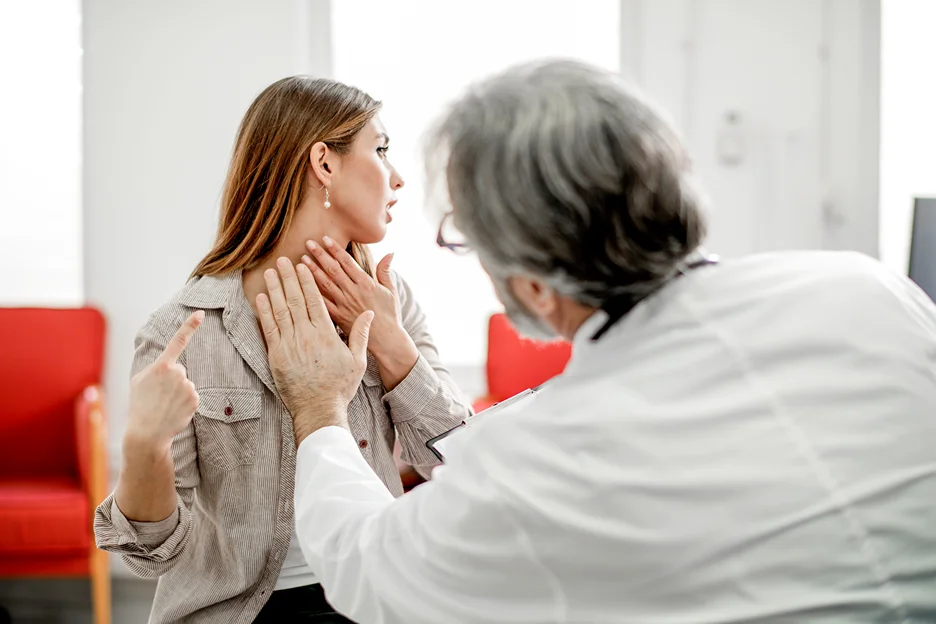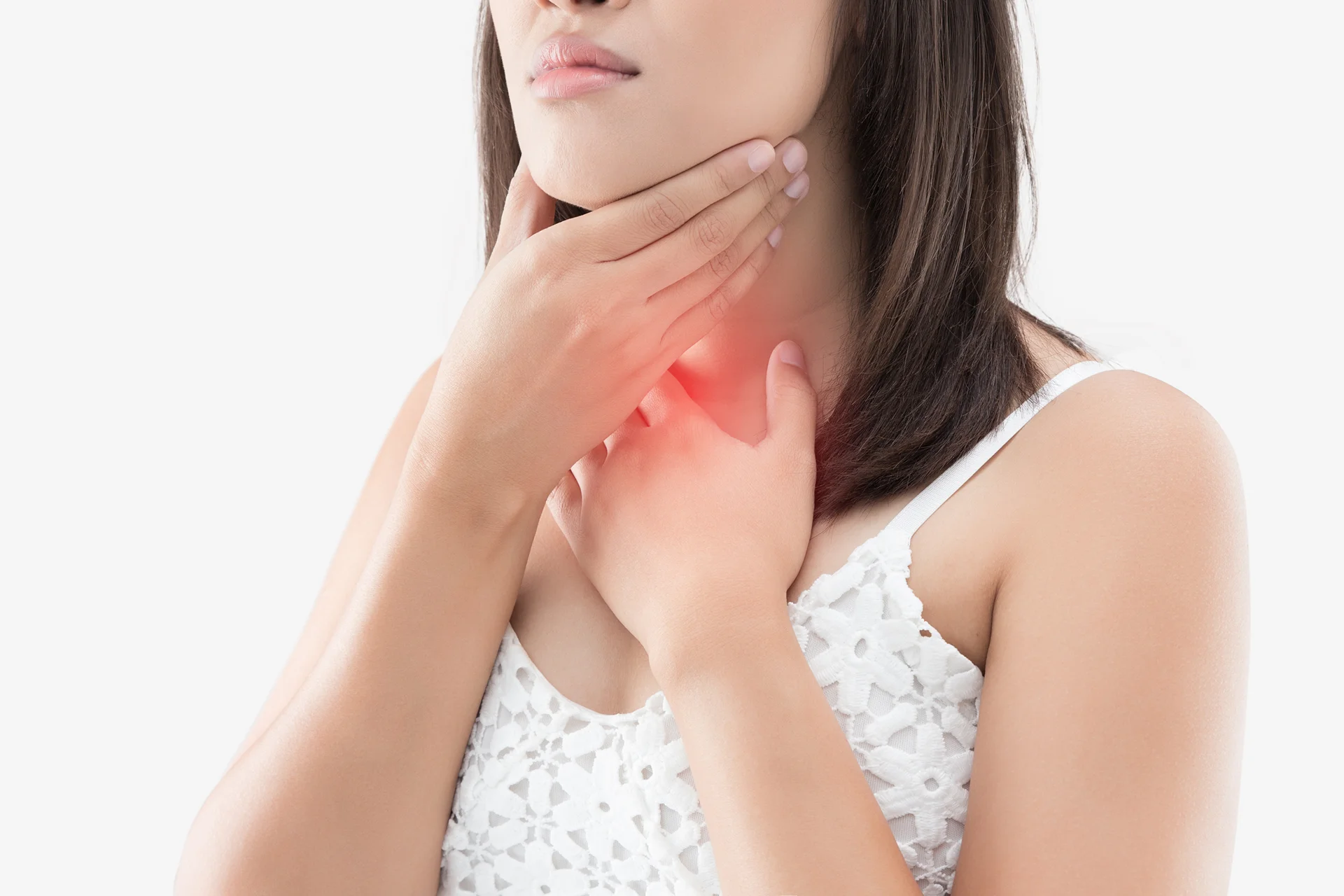The neck contains a high concentration of lymph nodes that play a critical role in the body’s immune defense against infections and diseases. When you feel a lump or pain on the sides or back of your neck, it often indicates inflamed or swollen lymph nodes, medically known as lymphadenopathy.
This is usually the result of your body fighting an infection or illness. However, in some cases, it can signal a more serious underlying condition.
The expert advice we shared here covers the causes of lymph node pain in the neck, when to see a doctor urgently, medical treatment options, home remedies for temporary relief, and tips to support long-term lymph node health.
What Might Be the Causes of a Swollen Neck Lymph Node?
A variety of conditions can cause the lymph nodes in your neck to become enlarged and painful. Identifying the underlying cause is crucial for proper treatment. Here are some of the most frequent causes:
Viral Infections
Viruses like mononucleosis, influenza, the common cold, chickenpox, and COVID-19 often lead to swollen lymph nodes as the body fights the infection.
Bacterial Infections
Bacterial infections such as strep throat, tonsillitis, tooth abscesses, and skin infections can trigger neck lymph node inflammation.
Fungal Infections
Fungal infections are less common but can sometimes cause lymphadenopathy when the fungal agent spreads to the lymph nodes.
Cancers
Is lymphoma associated with neck pain and lymph node issues? Yes, lymphoma and leukemia are blood cancers that directly affect lymph tissue. Other cancers like oral cancer may spread to the lymph nodes in the neck.
Immune Disorders
Autoimmune diseases like rheumatoid arthritis, lupus, and Sjogren’s syndrome can cause lymph node swelling as the body mistakenly attacks its own healthy cells and tissues.
Medications
Certain prescription and over-the-counter medications like anticonvulsants and antibiotics are linked to swollen lymph nodes as an adverse reaction.
Injury
Physical trauma from cuts, burns, or other wounds on the head or neck area may trigger temporary lymph node inflammation.
Other Factors
Swollen neck lymph nodes can also result from a localized infection in the mouth or throat, an inflamed salivary gland, or a skin condition like eczema or psoriasis. Even a tongue, lip, or nose piercing can become infected and lead to painful nodes.
Is there a connection between drinking alcohol and painful lymph nodes?
While sipping a glass of wine or beer does not typically trigger immediate lymph node pain, alcohol may exacerbate swelling and inflammation in people prone to lymph-related conditions.
Those diagnosed with diseases like Hodgkin’s lymphoma, which directly impacts lymph tissue, often find alcohol consumption correlates with aggravated lymph node tenderness and enlargement.
The dehydrating effects and impaired immune response from heavy, regular drinking sessions can also impede proper lymph drainage and flow, resulting in swollen, painful nodes.
Individuals with lymphedema, or chronic localized fluid retention caused by a compromised lymphatic system, frequently notice increased swelling in the limbs and enlarged lymph nodes after drinking alcohol.
What Do Lymph Nodes Do?

Lymph nodes are small, bean-shaped glands located throughout the body that act as filters for the lymphatic system. The lymphatic system serves as a drainage network that carries fluids, waste, and white blood cells and helps to fight infections.
Lymph nodes contain immune cells that trap viruses, bacteria, and other causes of illness. The neck contains over 300 lymph nodes, with clusters found near the ears, jaw, throat, and back of the neck.
When you feel pain or tenderness in these areas, it typically indicates inflamed or swollen lymph nodes. As part of the body’s immune response, the lymph nodes swell as they fill with white blood cells to fight infection.
What Are the Symptoms of Swollen Lymph Nodes in the Neck?
Along with feeling swollen lumps and tenderness in the neck, other signals your lymph nodes may be affected include:
- Fever, chills, and sweating
- Unexplained weight loss
- Coughing, sneezing, and respiratory illness
- Sore throat and difficulty swallowing
- Fatigue and muscle aches
- Skin rash or lesions on the scalp or face
- Redness, warmth, and swelling around nodes
The specific symptoms you experience can provide clues to the underlying cause. Make note of all your symptoms and be sure to report them to your doctor.
How Can You Determine If Your Neck Lymph Nodes Are Swollen?
- Use your fingertips to gently press and feel around the lymph nodes near the front of your ear. Apply light, circular motions.
- Slowly move down from the ear area along the neck muscles, feeling for any swollen bumps. Check down to the end of the neck and above the collarbone.
- Tilt your head toward the side you are examining to relax those neck muscles and improve sensitivity. Press fingers under the muscles when checking the sides of the neck.
- Hunch shoulders forward and lean elbows in to make the skin above your collarbone taut. Check thoroughly along the clavicle bone for any enlarged nodes.
- Repeat the process on the opposite side, comparing the size of any swollen nodes you detect. Healthy lymph nodes are typically less than 1 cm.
- Note any lymph node swelling that feels like a pea-sized or larger lump. Tenderness may indicate inflammation. Report enlargements to your doctor.
- Perform periodic self-exams to monitor lymph node changes and aid in prompt diagnosis of potential illnesses. Familiarize yourself with your normal lymph node size.
Seeking a Professional Diagnosis
If you develop swollen and painful lymph nodes in your neck, don’t ignore them. Make an appointment with your primary care physician right away for proper diagnosis and treatment. Your doctor will start by reviewing your medical history and performing a physical exam of your neck, including carefully feeling the lymph nodes for abnormalities.
Here are some of the diagnostic tests you may undergo:
- Blood Tests – A complete blood count can often detect infections or blood cell irregularities signaling cancers like leukemia and lymphoma.
- Biopsy – Your doctor may extract cells from an enlarged lymph node for examination under a microscope. This lymph node biopsy can help identify cancers and other diseases.
- Imaging – Advanced imaging techniques like CT scans, MRIs, and PET scans provide detailed views of the lymph nodes and surrounding tissues. Ultrasound is often used to examine swollen neck nodes.
- Infectious Disease Testing – Specific lab tests can pinpoint viral, bacterial, and fungal infections that may be causing lymphadenopathy.
Is There a Remedy for Swollen Neck Lymph Nodes?
Treatment will depend on the identified cause of your swollen neck lymph nodes.
| Condition | Treatment |
| Infections | Antibiotics for bacterial infections, antiviral medication for viruses. Drink plenty of fluids and get extra rest. |
| Cancers | Chemotherapy, radiation, immunotherapy, and sometimes surgery. |
| Inflammation | Over-the-counter anti-inflammatories like ibuprofen. Apply warm compresses to the tender nodes. |
| Immune Disorders | Corticosteroids, immunosuppressants, biologics, and other medications. |
| Injury/Irritation | Give the affected area time to heal. Avoid irritating jewelry, clothing, and skin products. |
If no specific cause is found, your doctor may opt to monitor your nodes over time. Seek immediate care if your symptoms worsen or new ones develop.
When to Seek Emergency Medical Care
While mild lymph node pain often resolves on its own, swelling and tenderness can occasionally indicate a medical emergency requiring prompt care. Rush to an emergency room or urgent care clinic if you experience:
- Difficulty breathing or swallowing
- Dizziness, chest pain, racing heart
- Severe headaches and neck stiffness
- Muscle weakness or coordination issues
- Rash, lesions, or ulcerations on the skin
These signs may point to a serious infection, blood clot, or fast-spreading cancer warranting quick diagnosis and treatment. Prolonged obstruction of the airway and blood vessels can have life-threatening consequences.
How Can You Relieve Pain From a Swollen and Painful Right Neck Lymph Node?
For mild, temporary lymph node pain and swelling, these self-care tips can help ease discomfort:
- Apply a warm compress to the tender nodes for 10-15 minutes several times a day. Use a warm washcloth or microwavable heating pad wrapped in a towel.
- Take over-the-counter pain medication like acetaminophen or ibuprofen to reduce inflammation and soreness.
- Massage the neck lightly and use gentle stretches to encourage drainage and circulation. Avoid aggressive massage directly on the swollen nodes.
- Stay hydrated by drinking plenty of water and fluids like herbal tea to support immune function.
- Get adequate rest and sleep to give your body a chance to heal.
- Avoid irritants like smoking, scented skin care products, and snug necklaces or scarves.
See your doctor if home remedies do not provide improvement within a few days. Self-diagnosing and delaying medical care can worsen the condition.
Prevention Tips to Keep Your Lymph Nodes Healthy
While some causes of swollen lymph nodes cannot be prevented, you can take measures to lower your risk:
- Practice good hygiene like hand washing to avoid infections from germs and bacteria.
- Eat a balanced, nutritious diet and stay physically active to boost your immune defenses.
- Avoid known irritants and allergens that trigger reactions and inflammation.
- Get regular medical checkups to diagnose and treat any underlying illnesses early.
- Stay up to date on vaccinations, including an annual flu shot.
- Limit alcohol use and quit smoking, as these can impair immune function and lymph node health.
- Use insect repellant and protective clothing in wooded and grassy areas to prevent tick bites that may transmit Lyme disease.
Pay attention to any lumps or tenderness arising on the sides or back of your neck. Consult your doctor promptly if you experience painful or swollen lymph nodes lasting more than a few days. With an accurate diagnosis, most cases can be treated effectively or managed with self-care. Listen to what your neck lymph nodes are trying to tell you.
Schedule a Consultation with a Lymph Node Specialist on Kaly

Kaly is an online healthcare platform that allows you to easily search for doctors and specialists, read reviews, and book appointments. If you are experiencing persistent or severe neck lymph node pain, schedule a consultation with a nearby lymph node specialist via Kaly.
Our advanced doctor search algorithm and real patient reviews help you find the right provider for your needs. Get access to top medical expertise while avoiding long waits.
Visit Kaly.com today to take control of your health!
Frequently Asked Questions
Is pain in the neck under the chin related to swollen lymph nodes?
Pain beneath the chin can result from swollen lymph nodes, crucial in fighting infections. Swelling may occur due to infections, often accompanied by tenderness, discomfort, and other symptoms like a runny nose or sore throat. While swollen lymph nodes are a common cause, other conditions can present similar symptoms.
Are tender lymph nodes in the neck common with a sore throat?
Yes, tender neck lymph nodes often accompany a sore throat. These nodes, key to the immune system, swell and become sensitive in response to infections. A sore throat is typically infection-related, leading to this common association, as lymph nodes store white blood cells that combat germs and infection.
What is the link between a swollen neck lymph node and fever?
The link between a swollen neck lymph node and fever is that they are both responses of the body’s immune system to an infection or illness. They often occur together when the body is fighting off an infection, especially an upper respiratory infection
Can right-sided neck swelling and soreness be related to lymph nodes?
Right-sided neck swelling and soreness often indicate active lymph nodes, signaling your body’s response to an infection. If these symptoms linger or come with other worrying signs, it’s vital to consult a healthcare provider to rule out severe conditions.
